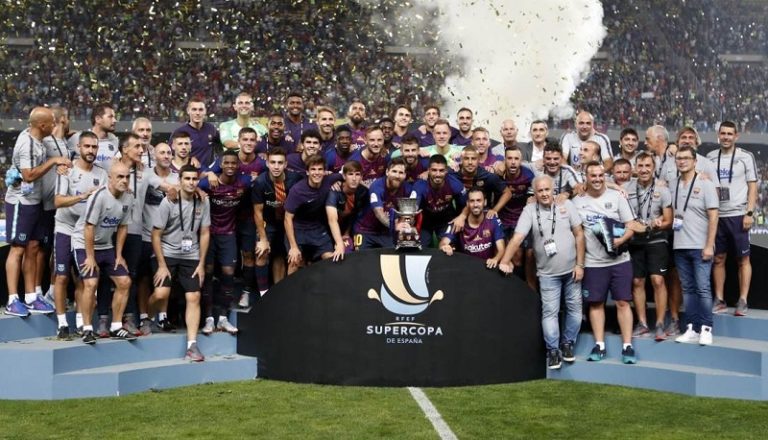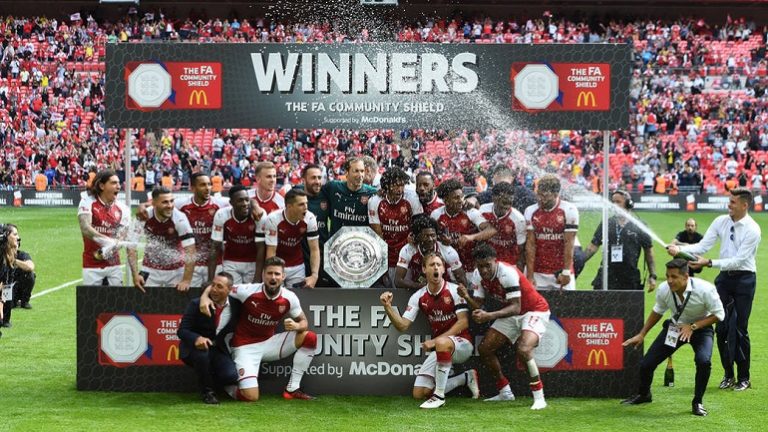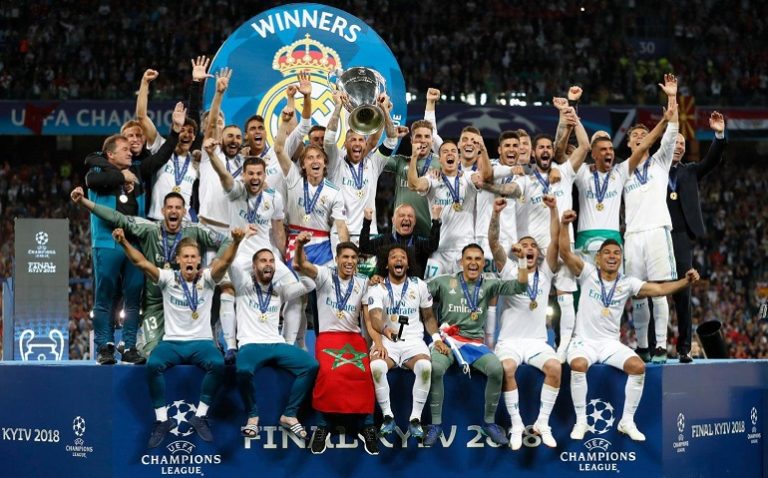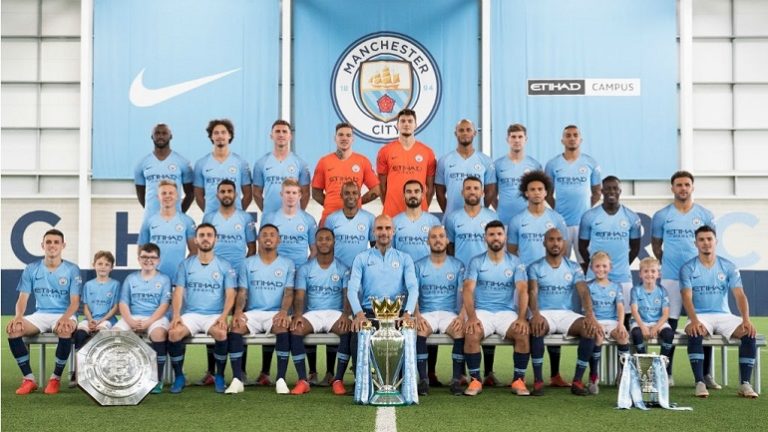Juventus F.C.

Based in Turin, Italy, Juventus or informally “Juve” is one of the most prominent, oldest, successful and professional football clubs of Italy. It plays in the top tier of the Italian football league, the Serie A and used to float around on many different grounds in Turin, its current home ground is the Allianz Stadium (July 2017). Apart from Juve, at home, it is adorably called by many nicknames, most notable of them is “La Vecchia Signora “(Italian: The Old Lady). The Juves won most domestic titles compared to others: 34 Serie A, 13 Coppa Italia titles, 3 UEFA Cups, 1 UEFA Cup Winners’ Cup, 2 European Cups. They at a stretch played in the top tier of Italian football league apart from a mishap of being relegated to the Serie B in 2006 following a scandal.
Present Lineup or Team Squad
Current manager of the club is Massimiliano Allegri (2014-present), was a former club level midfielder, scored 56 goals in 374 club matches, started as the manager of a Serie C level club in 2004.
Goalkeepers: Wojciech Szczęsny (No.1), Carlo Pinsoglio (No.21), Mattia Perin (No.22).
Defenders: Mattia De Sciglio(No.2), Giorgio Chiellini (No.3,captain), Martín Cáceres (No.4), Alex Sandro (No.12), Andrea Barzagli (No.15, vice-captain), Leonardo Bonucci (No.19), Joao Cancelo (No.20), Daniele Rugani(No.24), Leonardo Spinazzola (No.37).
Midfielders: Miralem Pjanić (No.5), Sami Khedira (No.6, 3rd captain) Blaise Matuidi (No.14), Juan Cuadrado (No.16), Emre Can (No.23), Rodrigo Bentancur (No.30).
Forwards: Cristiano Ronaldo (No.7), Paulo Dybala (No.10), Douglas Costa (No.11), Mario Mandžukić (No.17, 4th captain) Moise Kean (No.18), Federico Bernardeschi (No.33).
Summary of History
On 1st November 1897, boys, passionate about football, of ‘Massimo D’Azeglio’ high school congregated in the center of Turin, formed an athletic cum sports club. The club they formed called Juventus, meant “youth” after the ages of its founders, as the highest of them being only 17 years old. In 1899 the club was renamed as Foot-Ball Club Juventus. They initiated playing on the Piazza d’Armi (Parade Ground). Their initial kit was pink Colored; in 1903 they adopted black and white vertical stripes. Juventus joined the national football league in 1900 and won their first ever top tier league championship (which in 1929 became Serie A) in 1905. Following their initial success, the club went through a period of turmoil and a split in the club resulting their president and few key players leaving. The Post split rebuilding and revival of the club led the club past the WW1.
In 1923, the Agnelli family, the owner of the FIAT, took over the club and Mr Edoardo Agnelli, became the club’s new president. They built a new playing ground in Corso Marsiglia. Better players (like Combi, Grabbi, Rosetta, Bigatto, Munerati) and financial stability culminated as Juventus being triumphant in their second scudetto in 1925-26.
The 30s was a successful one, they won 5 consecutive scudetto from 1931 to 1935, and a Coppa Italia title in 1938 and 9 of its members were included in the World cup 1934 winning team.
In the following couple of decades Juventus been the shadow of their former prominent self, only won 1950, 1952, 58 Serie A and 1942, 59 Coppa Italia titles. In 1947 Gianni Agnelli took over as president and during this time the stars of the club were John Hansen, Praest, Carlo Parola, Giampiero Boniperti. In 1957-58 club signed John Charles (1957–1962) and Omar Sívori (1957–1965), together with the club’s veteran Giampiero Bonipetri (1946–1961) they formed the Magical Trio and paved the ways for many successes for their club, beginning with 1958 Scudetto title and league double Serie A and Coppa Italia titles in 1960.
In the 60s the Bianconeris only won 5 domestic titles. But in the 1970s they consolidated their position in Italian football. Under Giampiero Boniperti as president(1961-90), they triumphed over 10 scudettos, back to back 1972 and ‘73 scudetto titles guided by Čestmír Vycpálek and assisted by the players like Roberto Bettega, Franco Causio, and José Altafini. Another notable coach of the 1970s Giovanni Trapattoni (1976-86, 1991-94) guided them over 2 Serie A and their first ever UEFA Cup in 1977 victories in the 1970s. Under Trapattoni’s watch, the club won another 4 Serie A, 2 Coppa Italia (79, 83), European Cup in 1985, the Cup Winners’ Cup in 1984, the European Super Cup in 1984, the Intercontinental Cup in 1985 and another UEFA Cup in 1993 during his second spell. Under his tenure in the club, they contributed 6 members to the 1982 World Cup winning squad. A high point of the decade (the 80s) was getting their place in the European football ’s history, winning all three most significant UEFA titles in a single season. But the post-Platini and later part of the decade was less successful for the club.
In the year 1990, the Juves moved into a new stadium, won the UEFA Cup and Coppa Italia and for a record fee signed Roberto Baggio from Padova. Marcello Lippi (1994–99, 2001–04) succeeded Trapattoni in 1994 as manager, under his guidance they won 3 Serie A , 1 Coppa Italia, 2 Supercoppa Italia titles , European Champions League in 1995-96 beating Ajax in the penalties and 1996 European Super Cup and Intercontinental Cup, but lost in the 1997 and 1998 Champions League finals. In his second spell, the club won two more scudettos (2002, 2003). Succeeded by Fabio Capello the club was relegated to the Serie B due to their involvement in a five team match-fixing scandal in 2006, before winning 2005 and 2006 Serie A titles, of which the 2005 title was stripped of them and the 2006’s title was later awarded to Inter Milan. Following this scandal some key players left, some remained to see the club pass through that hard time, which they achieved by flying colors by becoming the Serie B champions and got promoted back to the Serie A.
After Claudio Ranieri (2007–09), Ferrara’s (2009-10) and Zaccheroni (2010), Luigi Delneri’s (2010-11) failed their stint as managers. Under new manager Antonio Conte (2011-14) the Bianconeri claimed three consecutive scudetto from 2012 to 2014, 2 Supercoppa Italiana (2012, 2013) titles. Claudio Ranieri was succeeded by the current manager Massimiliano Allegri, under whom Juventus continued their domestic winning streak. They remained champions in the Serie A till now (2018), a consecutive 7 Serie A titles and also consecutive Serie A-Coppa Italia doubles (2015 to ’18).
Honours
| Tournament | Year/Season |
|---|---|
| Intercontinental Cup (2) | 1985, 1996 |
| European Cup (2) | 1984–85, 1995–96 |
| UEFA Cup Winners’ Cup (1) | 1983–84 |
| UEFA Cup (3) | 1976–77, 1989–90, 1992–93 |
| European Super Cup (2) | 1984, 1996 |
| UEFA Intertoto Cup (1) | 1999 |
| Serie A (34) | 1905, 1925–26, 1930–31, 1931–32, 1932–33, 1933–34, 1934–35, 1949–50, 1951–52, 1957–58, 1959–60, 1960–61, 1966–67, 1971–72, 1972–73, 1974–75, 1976–77, 1977–78, 1980–81, 1981–82, 1983–84, 1985–86, 1994–95, 1996–97, 1997–98, 2001–02, 2002–03, 2004–05,[n] 2005–06,[o] 2011–12, 2012–13, 2013–14, 2014–15, 2015–16, 2016–17, 2017–18 |
| Serie B (1) | 2006–07 |
| Coppa Italia (13) | 1937–38, 1941–42, 1958–59, 1959–60, 1964–65, 1978–79, 1982–83, 1989–90, 1994–95, 2014–15, 2015–16, 2016–17, 2017–18 |
| Supercoppa Italiana (8) | 1995, 1997, 2002, 2003, 2012, 2013, 2015, 2018 |
Most Notable Players
Over its long history, as being the second oldest club of Italy after Genoa (1893), many standout players performed with the club during their career. Some of the most outstanding of them are:
- Pietro Anastasi (Forward, 1968–1976,307 appearances, 132 goals)
- Omar Sívori (Forward, 1957–1965, 259 appearances, 174 goals)
- Michel Platini (Midfielder, 1982–1987, 224 appearances, 104 goals)
- Dino Zoff (Goalkeeper, 1972–1983, 476 appearances, 0 goals)
- Roberto Baggio (Forward, 1990–1995, 200 appearances,115 goals)
- Alessandro Del Piero (Forward, 1993–2012, 705 appearances, 290 goals)
- Zinedine Zidane (Midfielder, 1996–2001, 212 appearances, 31 goals)
- Gianluigi Buffon (Goalkeeper, 2001–2018, 656 appearances, 0 goals)
- John Hansen (Forward, 1948–1954, 189 appearances, 124 goals)
- Gaetano Scirea (Defender, 1974–1988, 552 appearances, 32 goals)
- Roberto Bettega (Forward, 1970–1983, 482 appearances, 179 goals)
- Paolo Rossi (Forward, 1973–1975 & 1981–1985, 138 appearances, 44 goals)
- Boniek (Forward, 1982–1985, 133 appearances, 31 goals)
- Gonzalo Higuaín (Forward, 2016–2018, 105 appearances, 55 goals)
- Michael Laudrup (Forward, 1985–1989, 151 appearances,35 goals)
- Gianluca Vialli (Forward, 1992–1996, 145 appearances,53 goals)
- Filippo Inzaghi (Forward, 1997–2001, 165 appearances, 89 goals)
- Pavel Nedvěd (Midfielder, 2001–2009, 327 appearances, 65 goals)
- David Trezeguet (Forward, 2000–2010, 320 appearances, 171 goals)
- Fabio Cannavaro (Defender, 2004–2006 & 2009–2010, 128 appearances, 7 goals)
- Alvaro Morata (Forward, 2014–2016,63 appearances, 15 goals)
- Paul Pogba (Midfielder, 2012–2016, 178 appearances, 34 goals)
Sources:
https://www.juventus.com/en/club/history-and-mission/history/index.php
https://en.wikipedia.org/wiki/Juventus_F.C.




